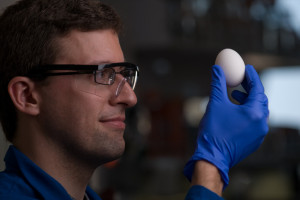
Researchers from UC Irvine have developed a way of unboiling eggs by restoring molecular proteins.
Image: Steve Zylius/UC Irvine
You can’t unscramble an egg, but you can unboil one.
Chemists from the University of California, Irvine (UC Irvine) have found a way to unboil an egg by quickly restoring molecular proteins.
But this development is not as much about the egg as it is the process, which has the potential to slash biotechnology costs. The researchers believe this new process has the ability to dramatically reduce costs for cancer treatments, food production, and other segments of the $160 billion global biotechnology industry.
“Yes, we have invented a way to unboil a hen egg,” said Gregory Weiss, UCI professor of chemistry and molecular biology & biochemistry. “In our paper, we describe a device for pulling apart tangled proteins and allowing them to refold. We start with egg whites boiled for 20 minutes at 90 degrees Celsius and return a key protein in the egg to working order.”
The main purpose of the process is to quickly and efficiently produce or recycle valuable molecular proteins.
This from UC Irvine:
To re-create a clear protein known as lysozyme once an egg has been boiled, he and his colleagues add a urea substance that chews away at the whites, liquefying the solid material. That’s half the process; at the molecular level, protein bits are still balled up into unusable masses. The scientists then employ a vortex fluid device, a high-powered machine designed by Professor Colin Raston’s laboratory at South Australia’s Flinders University. Shear stress within thin, microfluidic films is applied to those tiny pieces, forcing them back into untangled, proper form.
Want to see more research in biotechnology? Head over to the Digital Library to see our scientists’ latest publications. (BTW: Don’t forget to sign up for our free e-Alerts and RSS Feeds!)


